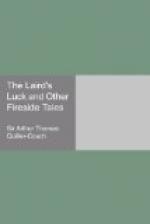I took my way down the hillside in no gay mood. I had travelled far; my nerves were raw with lack of sleep. I judged myself at least a day ahead of any convoy with which the captain could be travelling, even though it had moved with the minimum of delay. But where in the next two days was I to find the help which Mina had refused? To be sure I had caught up at Sedano a flying rumour that the curate Merino had eluded Bonnet, broken out of the Asturias, and was again menacing the road above Burgos. I had come across no sign of him on my way, yet could hit on no more hopeful course than to hark back along the road on the chance of striking the trail of a man who as likely as not was a hundred miles away.
It was about nine in the morning when Mina gave me his answer, and at three in the afternoon I was scanning the road towards Miranda de Ebro from a hill about a mile beyond Arinez (the same hill, in fact, where General Gazan’s centre lay little more than a year afterwards on the morning of the battle of Vittoria). I had been scanning the road perhaps for ten minutes when my heart gave a jump and my hand, I am not ashamed to confess, shook on the small telescope. To the south-west, between me and Nanclares three horsemen were advancing at a walk, and the rider in the middle wore a scarlet jacket.
It took me some seconds to get my telescope steady enough for a second look, and with that I wheeled my horse, struck spur and posted back towards Salvatierra as fast as the brute would carry me through the afternoon heat.
I reached Mina’s camp again at nightfall, and found the chief seated exactly as I had left him, still smoking and still dangling his legs. Were it not that he now wore a cloak against the night air I might have supposed him seated there all day without stirring, and the guard who led me to him promised with a grin that I was dangerously near one of those peculiar modes of death which his master passed his amiable leisure in inventing.
At the sight of me Mina’s eyebrows went up and he chuckled, “Indeed,” said he, “it has been a dull day, and I have been regretting that I let you off so easily this morning.”
“This morning,” I said, “I made you an offer of twelve thousand francs. You replied that you considered it too little for the services of your army. Perhaps it was; but you will admit it to be pretty fair pay for the services of a couple of men.”
“Hullo!” He eyed me sharply. “What has happened?”
“That,” I answered, “is my secret. Lend me a couple of men, say, for forty-eight hours. In return, on producing this paper, you receive twelve thousand francs; that is, as soon as Lord Wellington has assured himself on my report that you received the paper from me and did as I requested.”
“Two men? This begins to look like business.”
“It is business,” said I curtly. “To your patriotism I should not have troubled to appeal a second time.”




